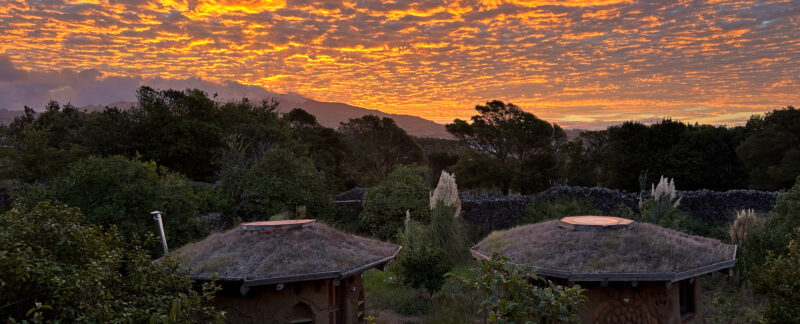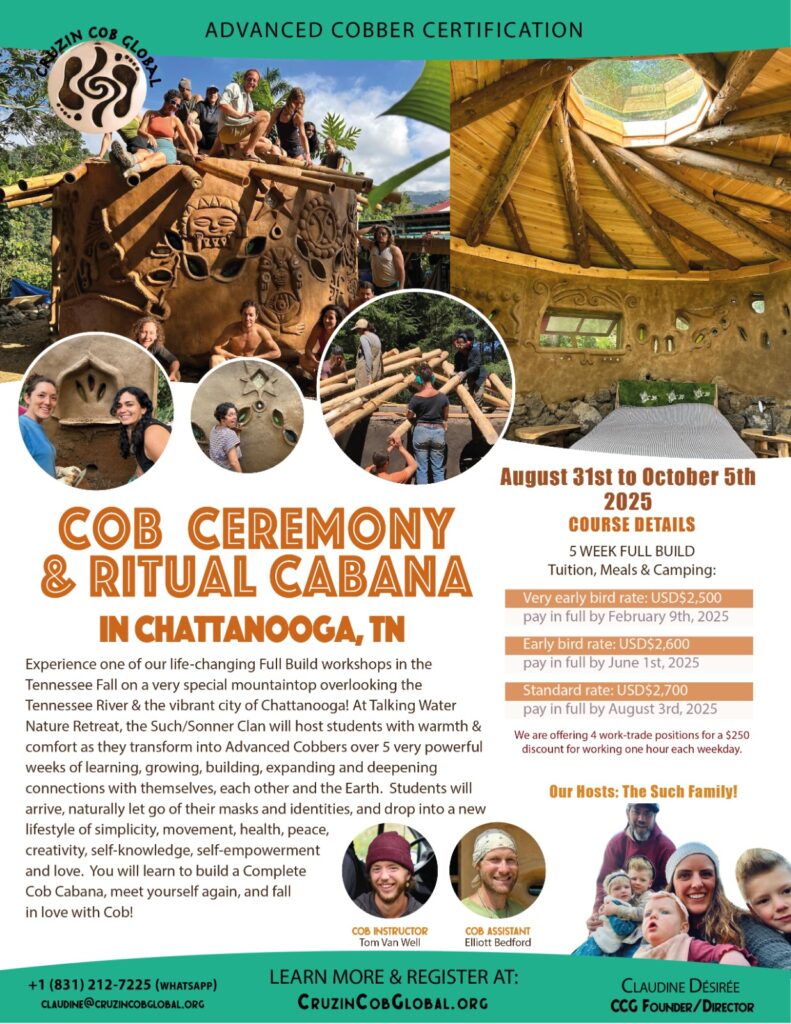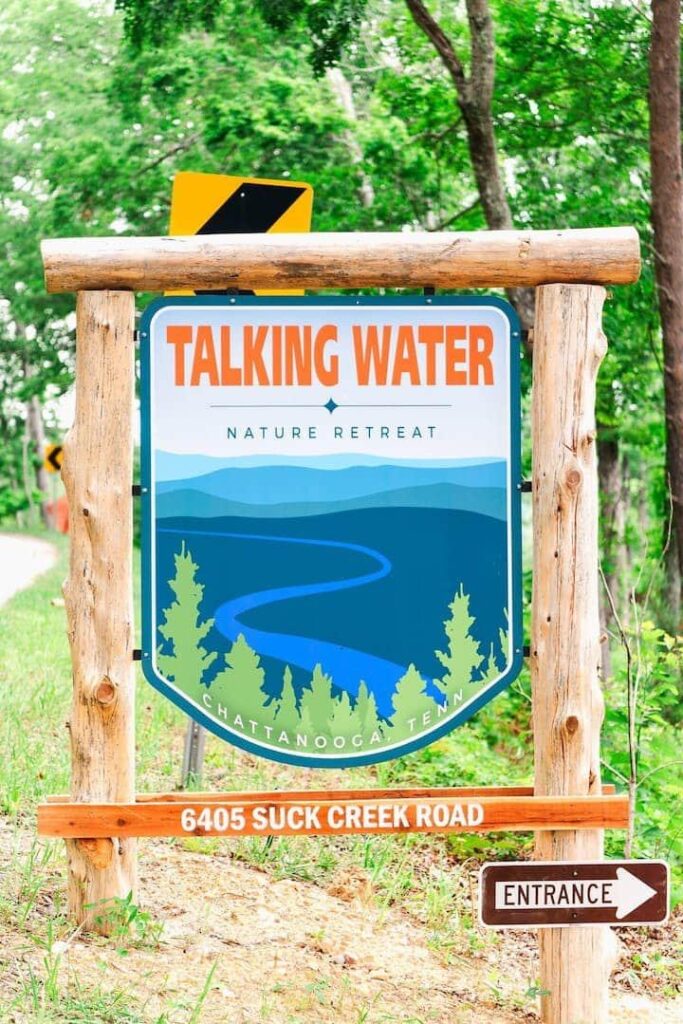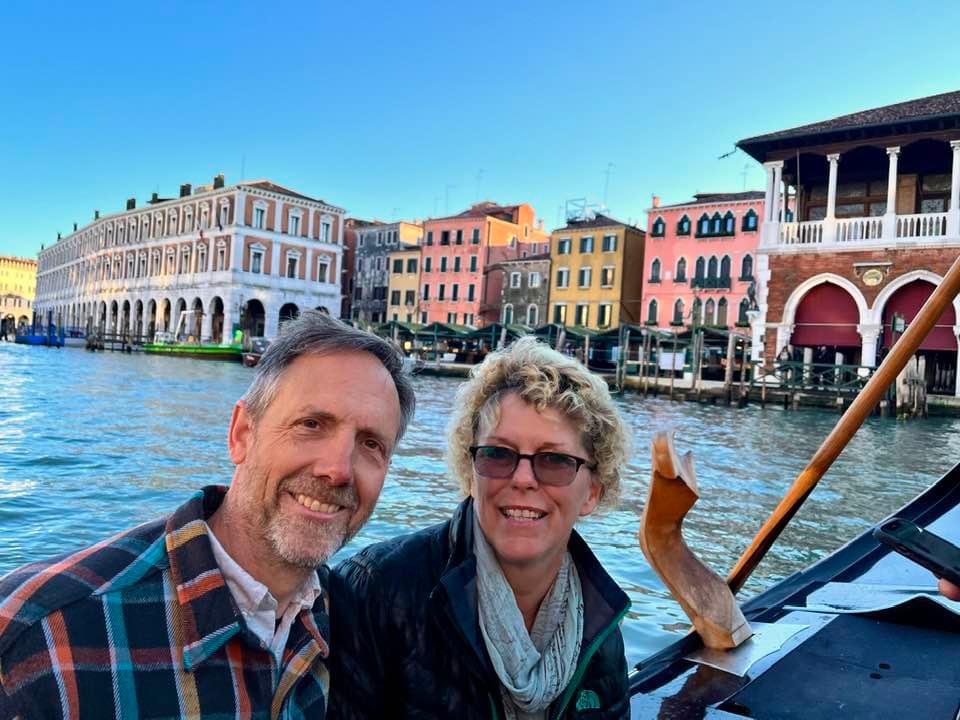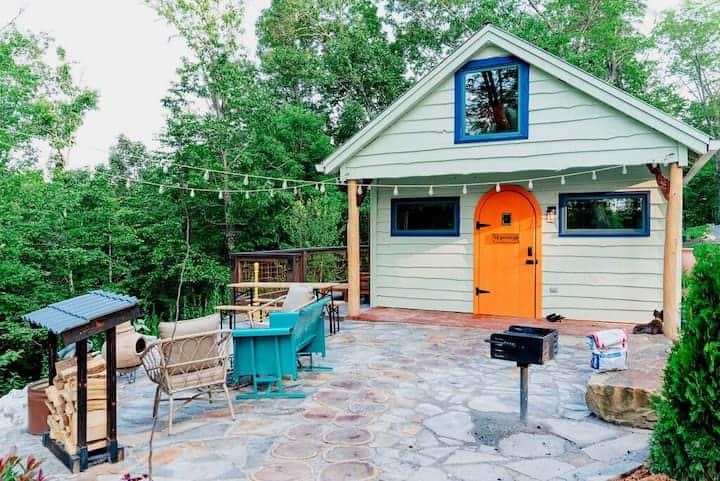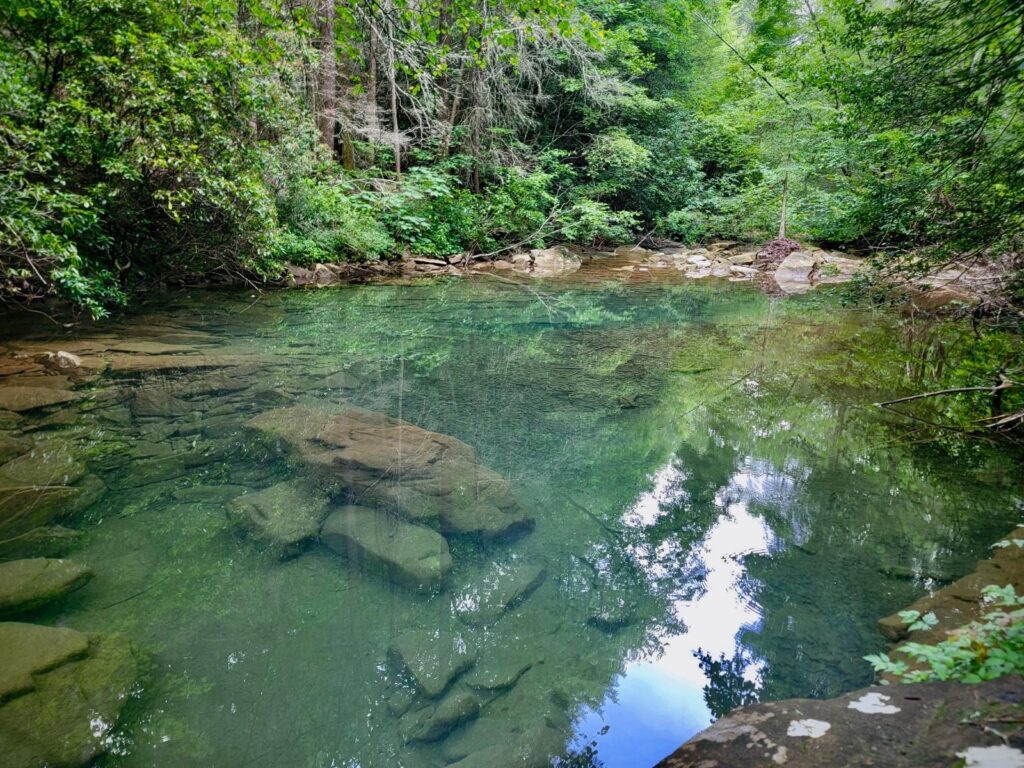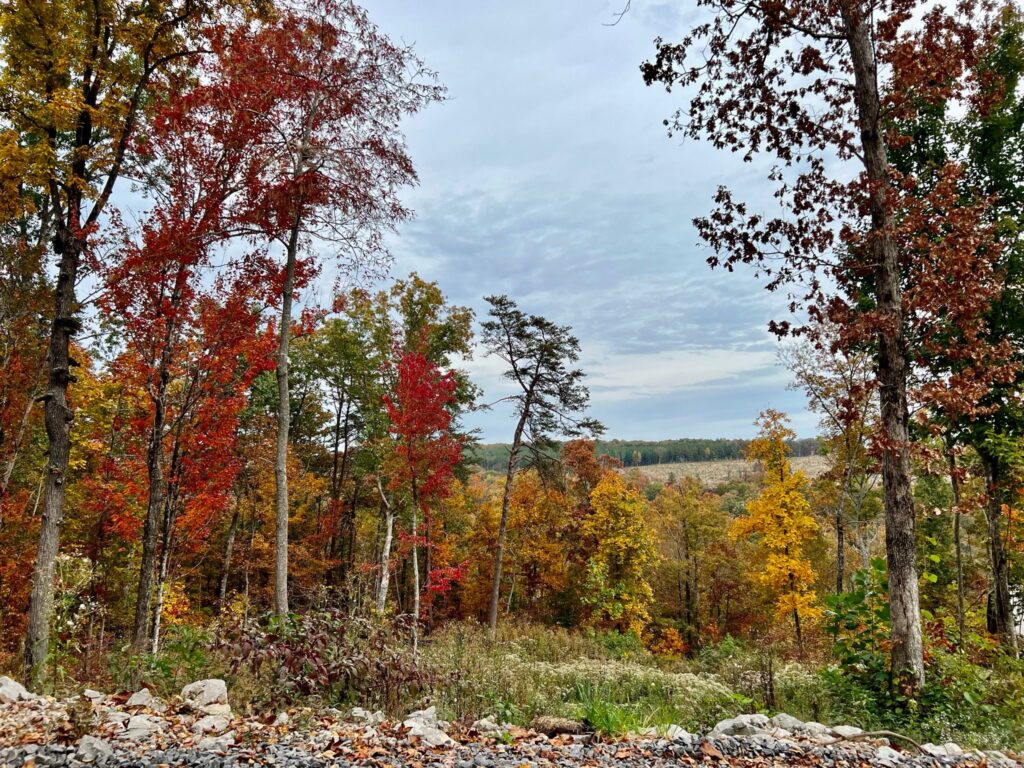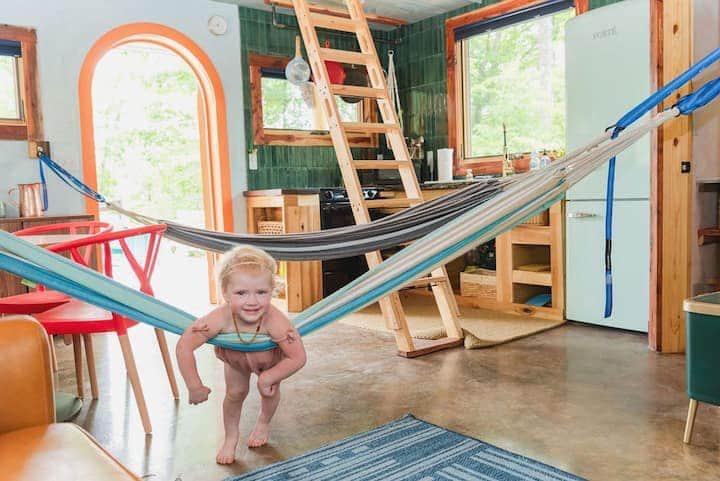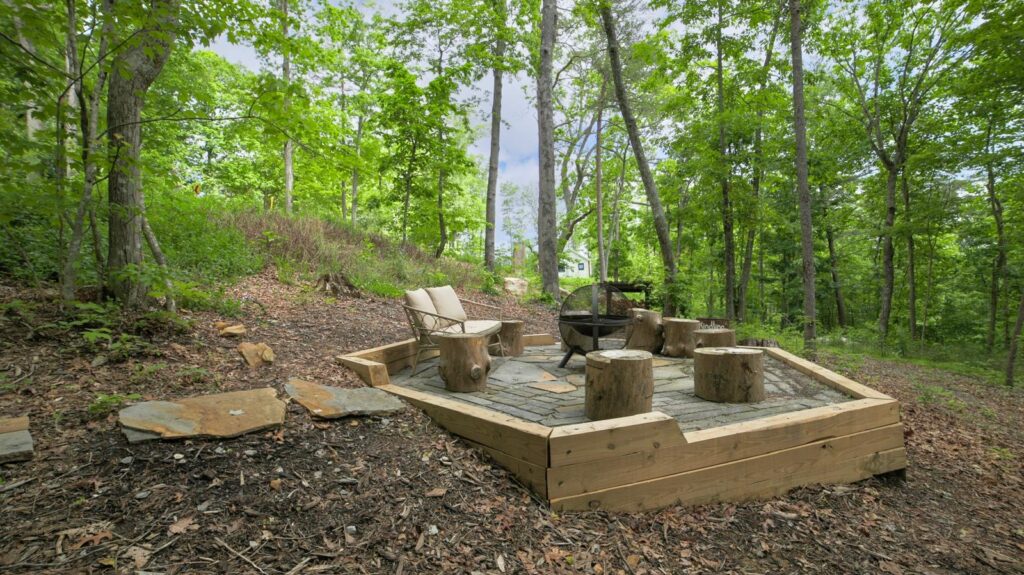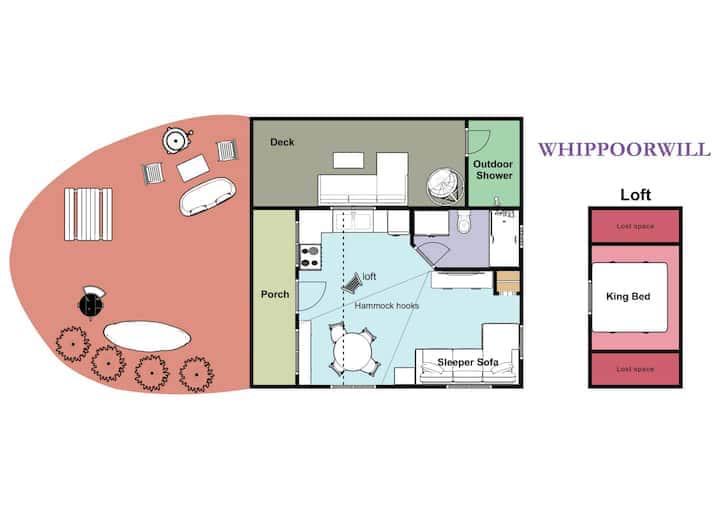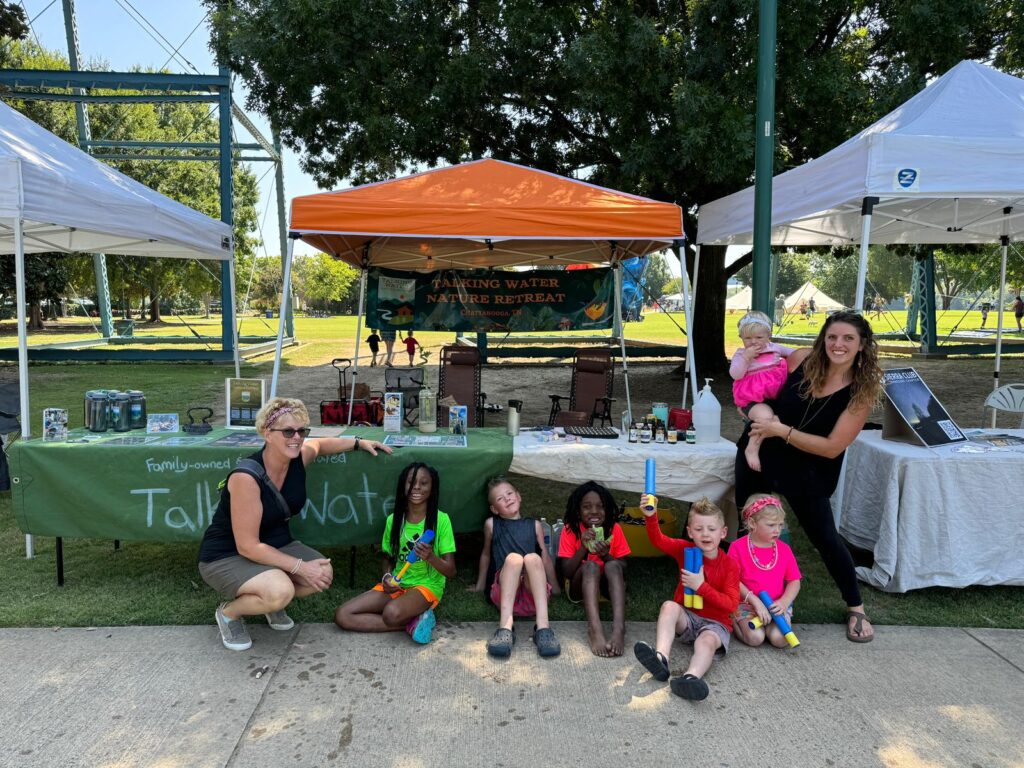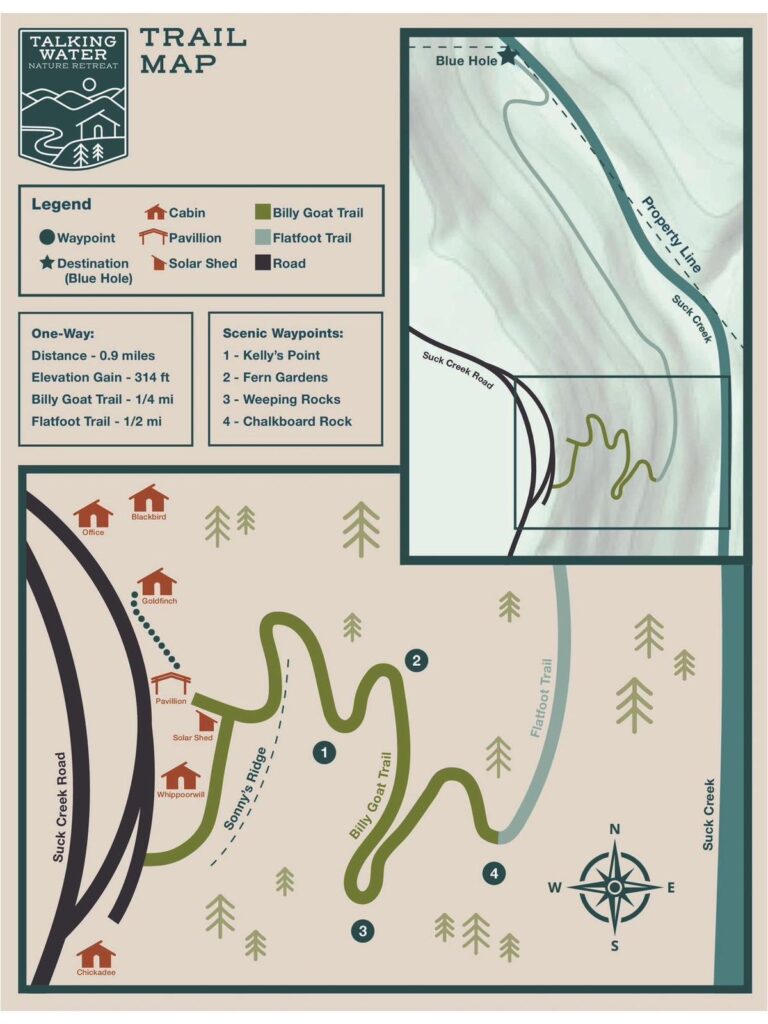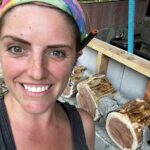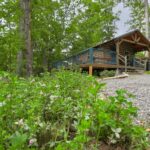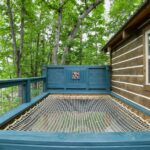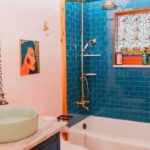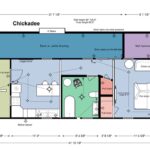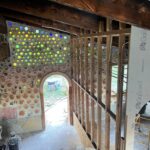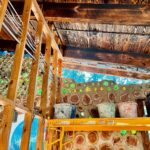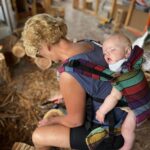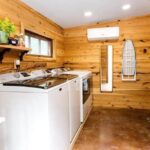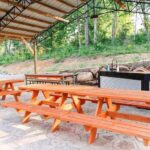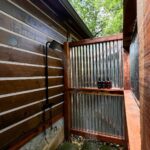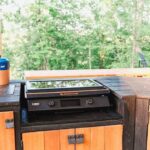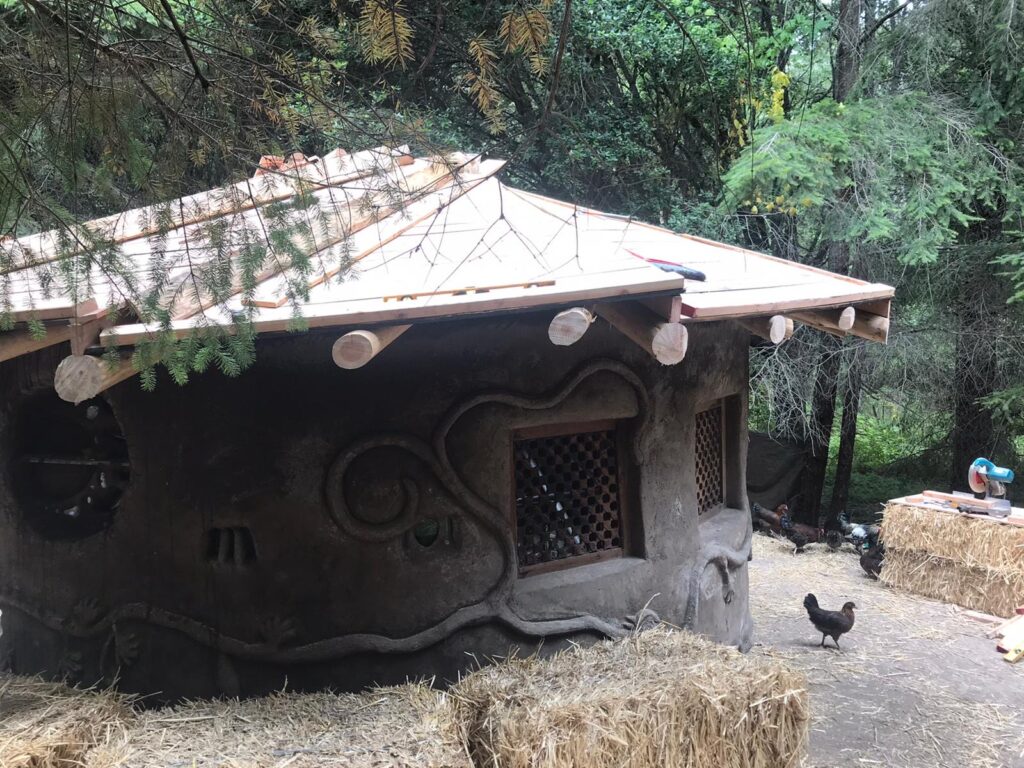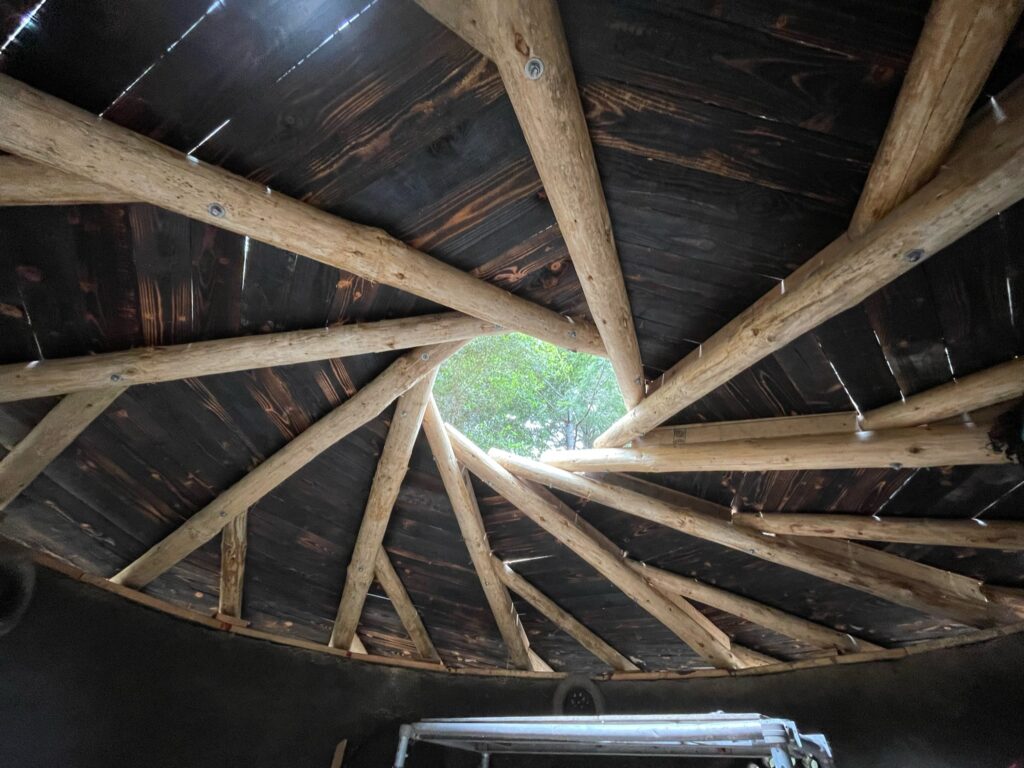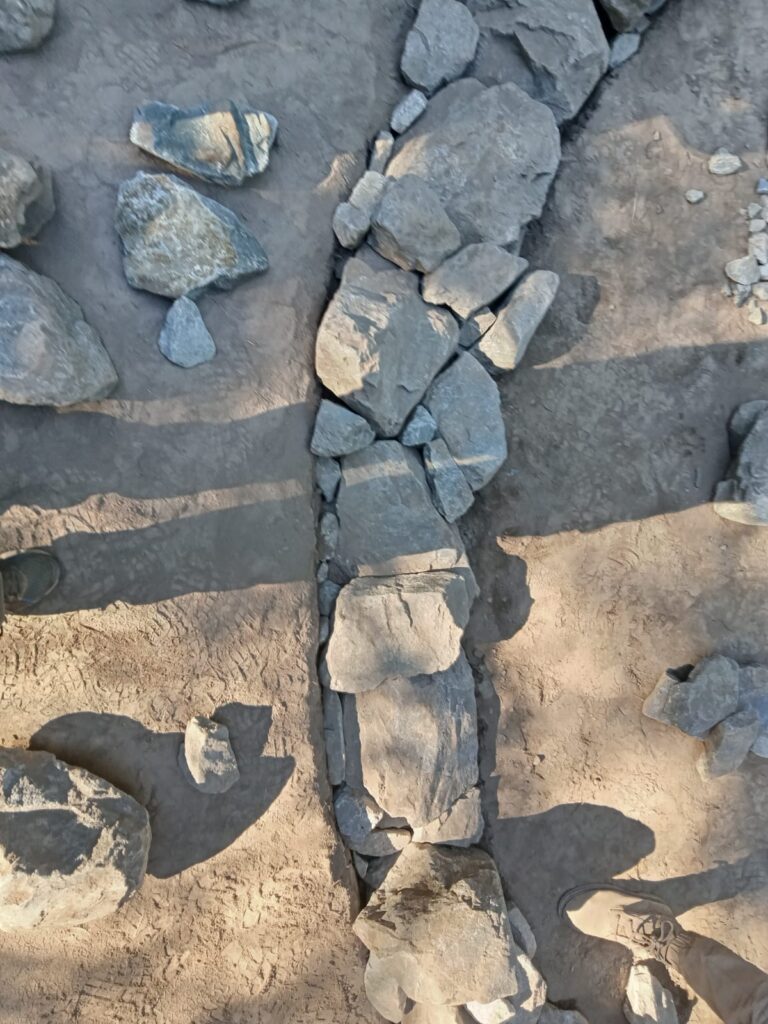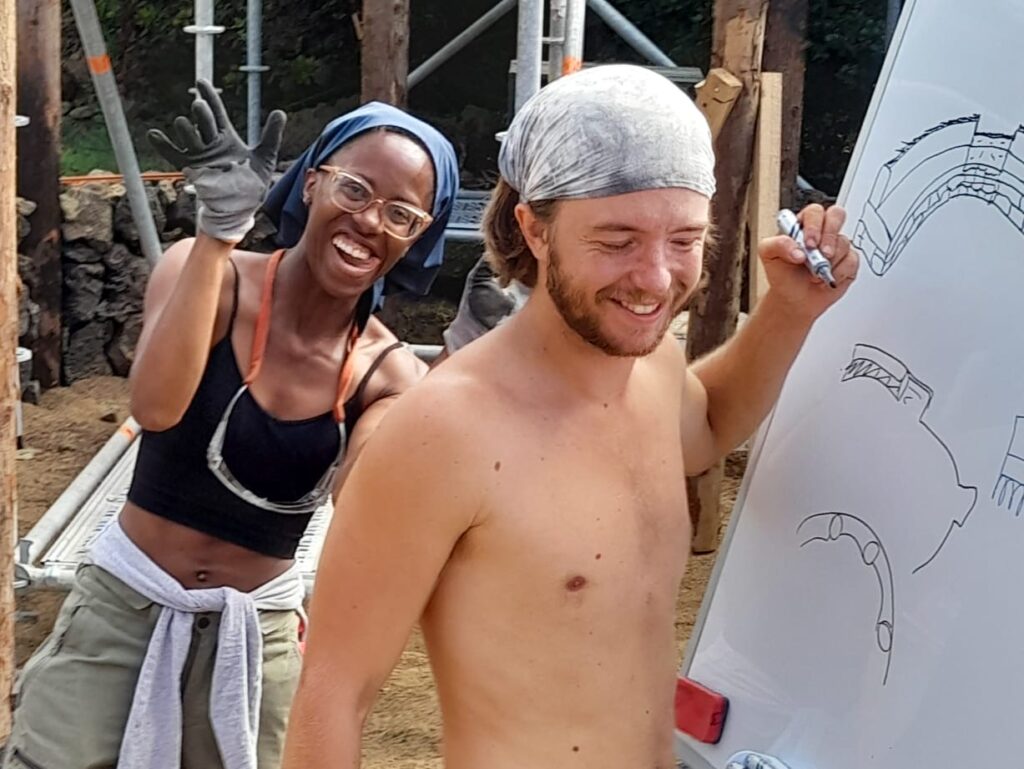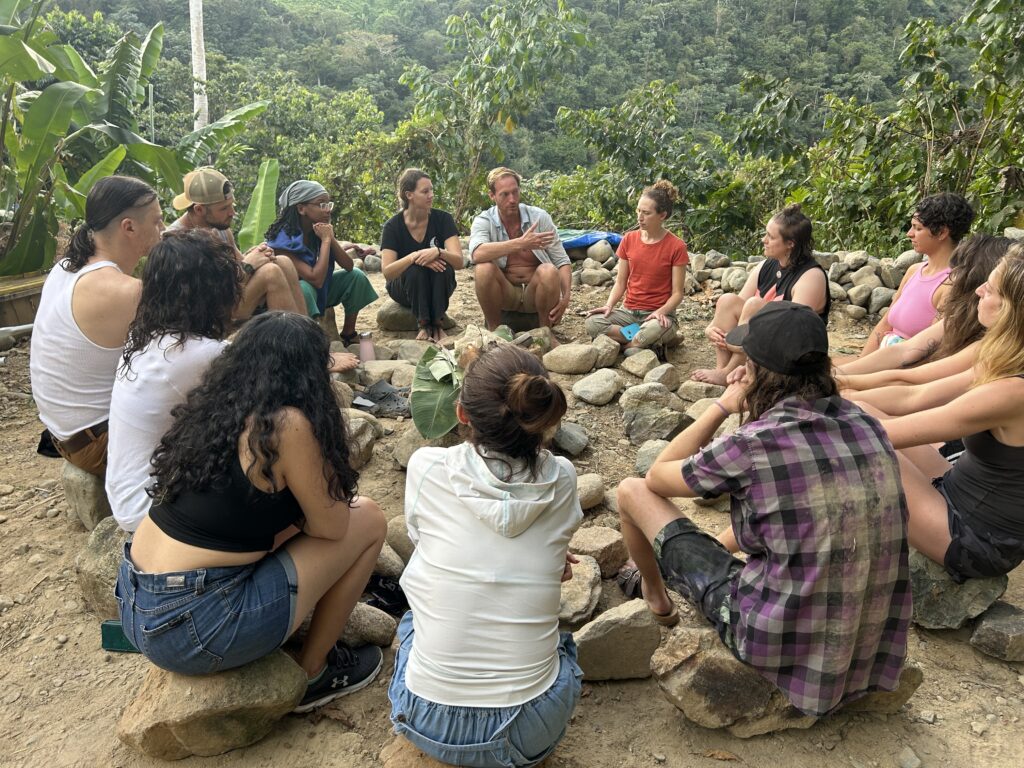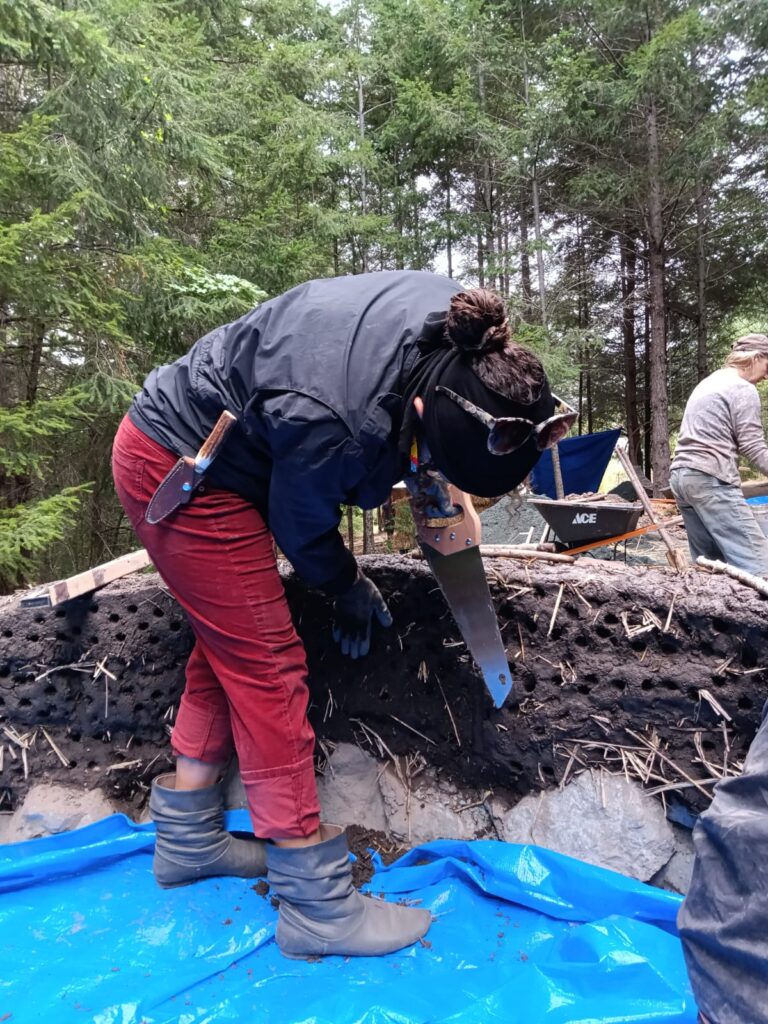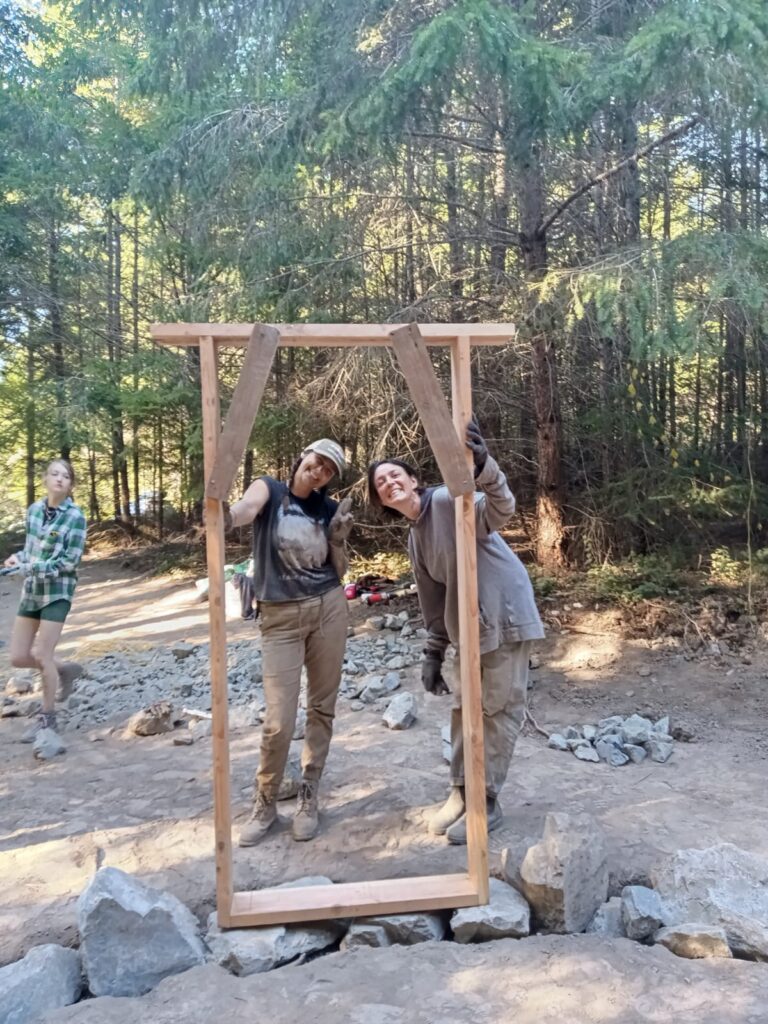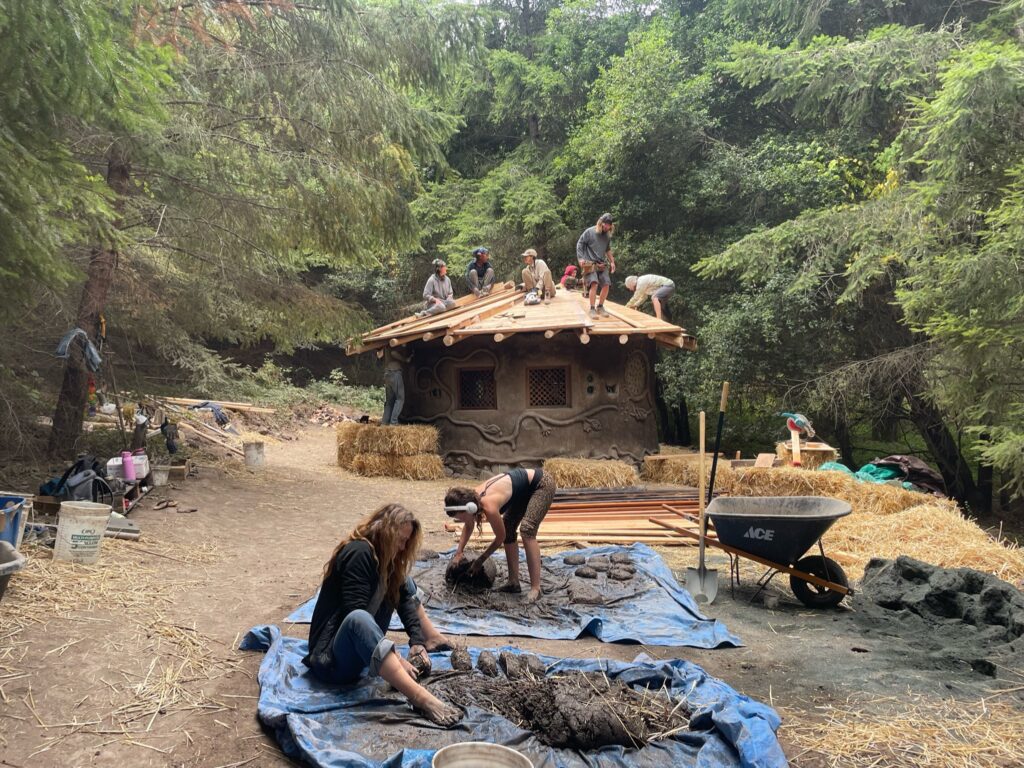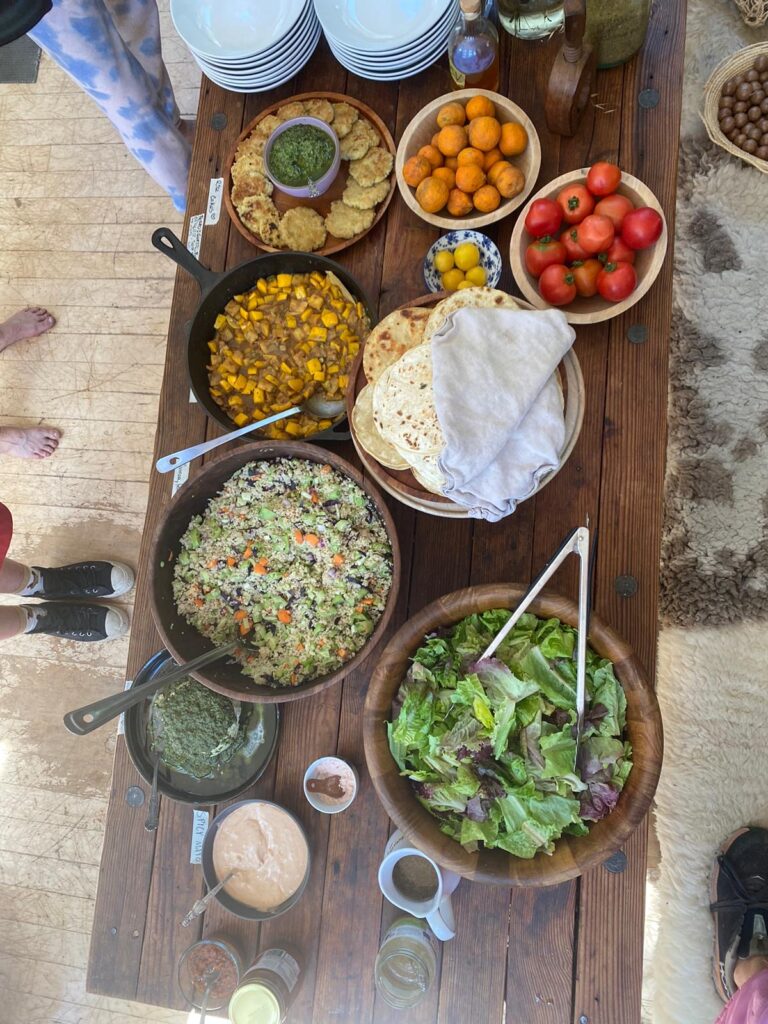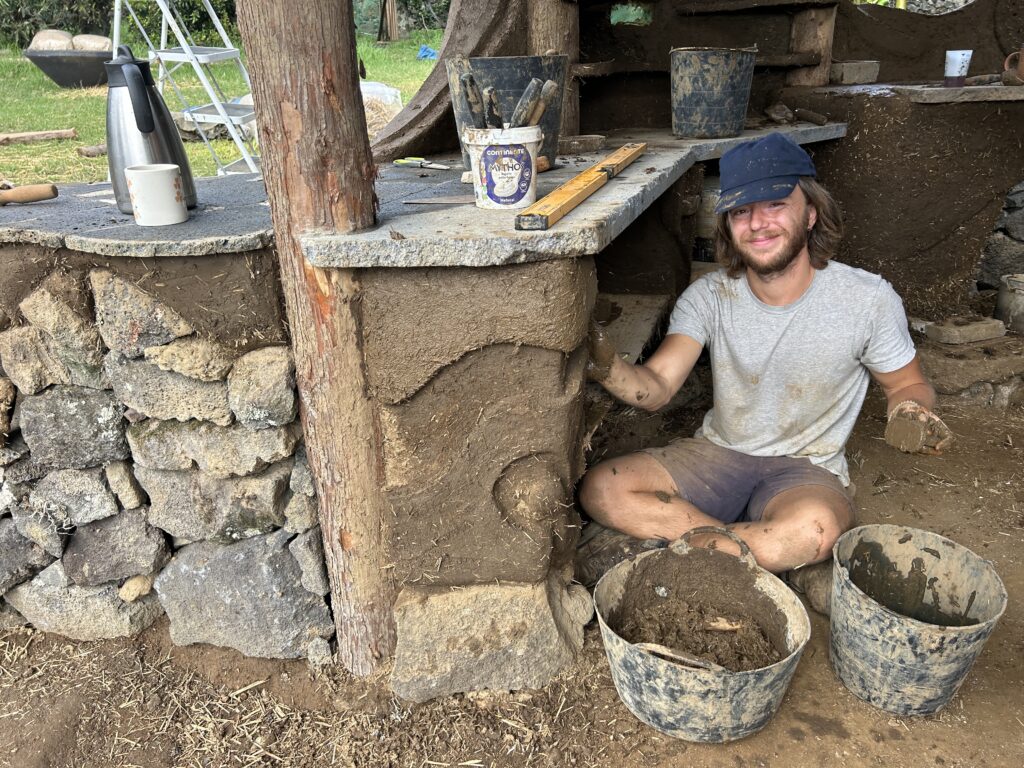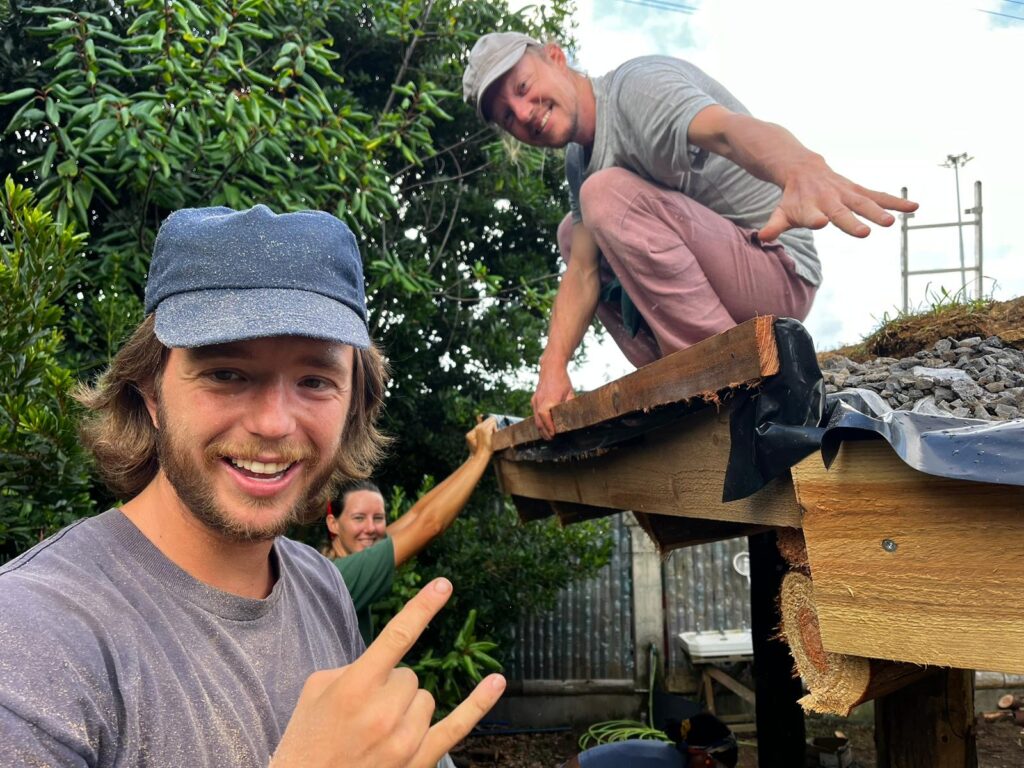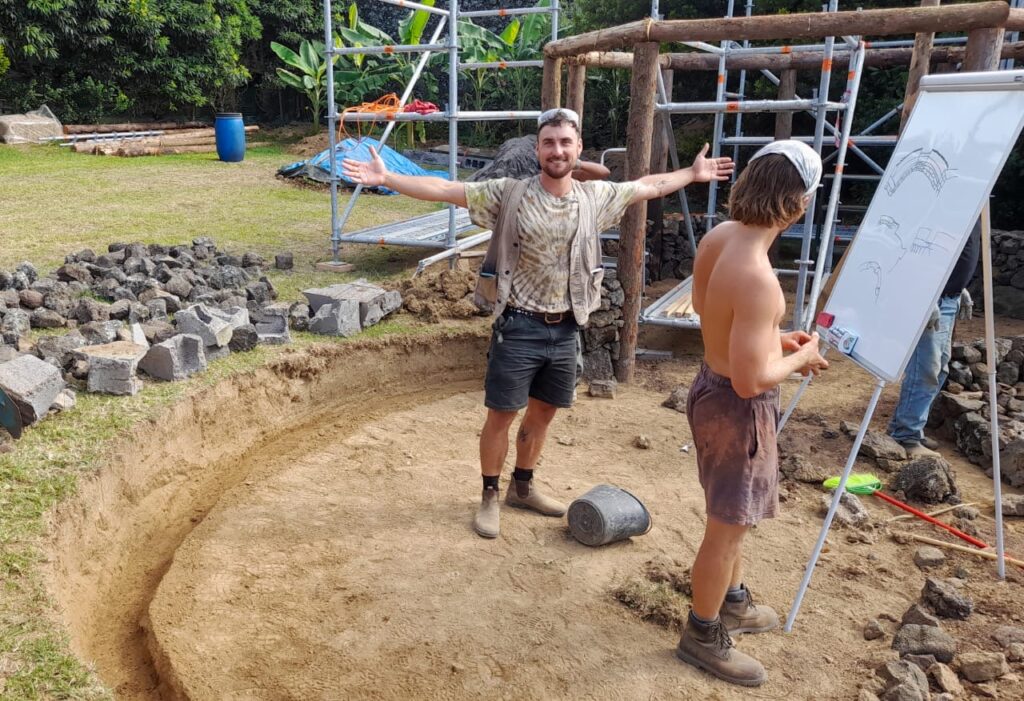Date/Time
Date(s) - Sunday, August 31, 2025 - Sunday, October 5, 2025
8:30 am - 5:30 pm
OUR HOST FAMILY
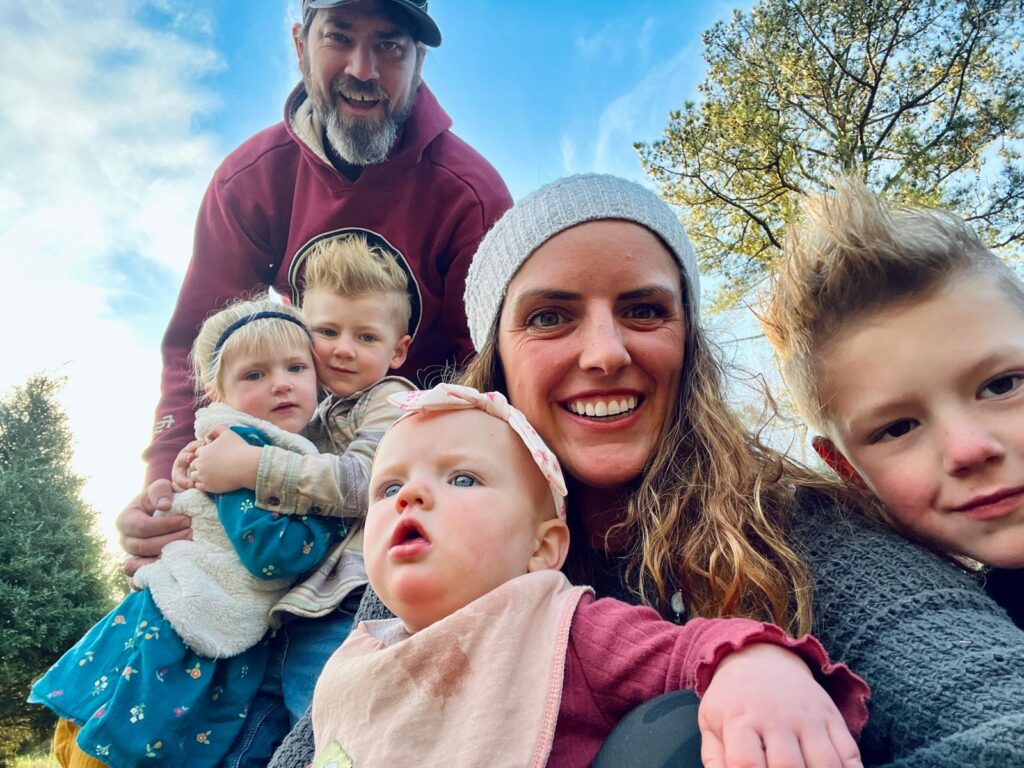
Our Beautiful Vibrant Host Family: James & Bobbie with their kids Geronimo (on the right of Mom), Ulysses & Clementine (below Dad) & Ernie Kate.
My name is Bobbie Such. I am a registered art therapist by trade, but much of my energy goes into raising my 4 young kids and into running our family business. I have a passion for construction, creative design, and problem-solving – I am always getting my hands dirty in a project (or two!). There is always a building to construct or a trail to build!
In 2022, I somehow convinced my parents, John & Karen Sonner, my brother Ken Sonner, and my husband James Such, to pool together all of our resources and convert a mountaintop mudpit into a nature retreat. And it worked!
We purchased 82 acres of land on the edge of Chattanooga, Tennessee, our small city, stabilized erosion, and got to work constructing our first 4 cabins at Talking Water Nature Retreat. I am the main point-person for most Talking Water activities, but each member of our family has played a key role.
We focus on eco-friendly design and practices and our goal is to contribute back to our mountain community, protect the natural environment, and also create a place of wonder for people to visit and in which to feel inspired. I get a lot of creative satisfaction in incorporating repurposed materials and playing
with pattern and texture in my designs. I hope that it shows across Talking Water’s landscape and buildings! Our cabins all include natural plaster walls and we also incorporated Earthbuilding techniques, including Cordwood Construction and Hempcrete. We are excited to build with Cob!
More about our family: My parents both have mountain roots. My paternal grandmother, Sandy, grew up on Signal Mountain in Chattanooga and my mom’s family toiled away in Appalachian coal mines for generations. Both are quasi-retired these days and lead a nomadic lifestyle. My dad, John, accepts contract gigs for project management which see him traveling the world at the moment. My mom, Karen, was an elementary school teacher for decades and now alternates between laboring away at Talking Water and living a carefree existence globe-trotting with John. She will be the additional host present for the Cob workshop.
My husband James is originally from Florida. He spent his whole life in Tallahassee before we met, working as a metal roofer and a tire delivery truck driver. We have lived in Chattanooga since 2016 and during that time he has remained with a foundation repair company, working his way up the ladder to become the local branch manager. He helps out at Talking Water a day or two a week with maintenance (he gets called when a pipe bursts or we need to move dangerous materials without kids around). My brother Ken Sonner is a bachelor with a fantastic teenage son, Slade. Ken works a desk job in New England, but his passion is for construction and land maintenance. He is constantly caring for his animals and diving in to construction projects on his own land. Slade is a senior in high school and currently obsessed with football. Both guys are big softies with innate physical strength – it comes in handy!
Our kids range in age from 1 year old to 7 years old. All the kids pitch in around the property and have knacks for mechanics and construction. Our oldest, Geronimo, is a self-proclaimed future engineer and attends a nature-based public school. Our middle two, Ulysses and Clementine, attend a local forest pre-school a couple days a week. Our youngest, Ernie Kate, spends all day hanging out with me. They are social creatures and love chatting away with our guests 🙂
We plan to construct a ceremonial room during this workshop. We built Talking Water as a place where larger groups can travel together but have the ability for folks to recharge in separate cabins at the end of the day. We have a central pavilion with a firepit, grill, cabinets, tables, and some recreation, but we envision an additional space for reflection, meditation, yoga, weddings, or other small indoor gatherings to take place. We want to have fun during the construction and look forward to the input of our guests!
Talking Water is an active vacation rental site. As such, we do have 1-2 cabins available for guests to rent at a reduced cost for the duration of their stay. Each cabin sleeps 4-5 people in beds and 2 people in hammocks. The cabins have small kitchens, full indoor bathrooms, outdoor showers, and relaxation space. We also have fire pits and campsite grills outdoors. At this time, we are recommending 2-4 people share in the rental of Whippoorwill Cabin for $60 per night. We can open up Goldfinch and/or Blackbird cabins for the same rates if more students want indoor accommodations. Instructors will stay in Chickadee cabin and other students are welcome to camp outdoors between Whippoorwill and Chickadee. We also provide access to 2 washers and 2 dryers for use in the evenings.
Talking Water is located on Suck Creek Mountain, 20 minutes from downtown Chattanooga, Tennessee. The property includes 1 mile of Suck Creek and there are hiking trails on the property which lead to the water (including blue holes). Our property also connects to Prentice Cooper State Forest, known for great rock climbing, mountain biking, kayaking, hiking, and swimming. If you like trees, rocks, and water, you will love life on our mountain. 🙂
Chattanooga has a rich history (it was the heart of the Cherokee Nation) and is a vibrant city today. We pride ourselves on our natural beauty and anticipate becoming the first National Park City in the United States prior to this workshop beginning. There is an endless amount of public outdoor recreation across the city and numerous festivals/events every weekend, especially in the fall. We are also bursting with locally-owned businesses and restaurants across the city (foodies love us). On the off chance that you get bored with Chattanooga, we are a 2-hour drive to Atlanta, Nashville, Huntsville, and Knoxville as well as 3 hours to Asheville.
Our fall seasons are somewhat unpredictable. The last two summers have been unusually dry, but the year prior was consistently rainy. Regardless, the temperatures tend to be mild and the fall foliage is stunning. Our property is on a mountaintop and does include 10-40’ bluff lines (i.e. don’t walk towards cliffs at night).
Students have to be aware that copperheads and rattlesnakes, although uncommon, are native to the area. We tend not to have many mosquitos due to the light breeze, but they are around as well.
MORE PHOTOS….
- Bobbie!
- Chickadee Cabin
- Hammock at Chickadee
- Whippoorwill Bathroom
- Chickadee Floor Plan
- Goldfinch cabin: timber-framed wth 14″ cordwood exterior wlls and hempcrete/plaster interior wallsCordwood build
- Cordwood Cabin in process
- Gransm Karen on double duty debarking cedar logs for cordwood construction!
- Laundry Room
- Central Paviliom for Mealtime
- Outdoor Showers
- Grill
THE PROJECT
The 5-week Advanced Cobber Certification Workshop students will be building a Cob Cabana to embellish Talking Waters Nature Retreat with an additional space for reflection, meditation, yoga, weddings, ceremonies, rituals and other small indoor gatherings. These will take place in an intimate, sacred and soulful structure created, as always, with 12-15 pairs of loving muddy hands and feet. From the “boots”, or rock foundation, to the “hat”, or reciprocal green roof, our trademark BEST roof ever for a cob cabana, we will cover everything in between! Students leave full of inspiration, motivation, passion, empowerment and hunger for more. Did we tell you that Cob is an addiction? The best kind!
We will be building a 14m2/150ft2 round building (final size is always dependent on class number). The breathtaking reciprocal roof structure we build in all of our workshops is the strongest roof there is, due to its interlocking spiral structure which holds itself up with no outward pressure on the monolithic round wall of the building. In addition, it mirrors the horizontal social structure favored in indigenous societies, who meet under these types of rooves for council circles and ceremonies.
Students in this Advanced Cobber Certification training will, as always, learn all the steps to building a complete Cob Building from scratch. In week 1, we dig the rubble trench and fill it with a sturdy aesthetic stone foundation to support the wall and roof, and finish the week off by pouring the adobe/cob floor on a gravel base. In weeks 2 & 3, we build the monolithic cob wall with all its detailed insertions and finish it with 1-2 days of relaxed sculpting. In week 4 we plaster our beautifully-decorated and strong wall with an earthen mix followed by the reciprocal green roof installation and finishing the wall and the second floor coat at the end of week 5.
We especially invite non-White and multiracial students who are curious or already interested and passionate about earthen construction to come learn the art and technique of cob building with CCG. We want a workshop that feels comfortable for non-white students, and aim for a healthy balance as our ideal. CCG has taught in many countries of the world
and our mission is to create access to everyone interested, especially the local people, so we can create international cob building families where all students grow and learn on a personal and interpersonal level. We aim to create intercultural and interhuman bonding experiences through our Cob building workshops to heal the world one Cob house at a time. So please follow your Heart & Soul, listen to the Call, and come and embark on a life-changing adventure in 2025.
DETAILED WORKSHOP DESCRIPTION
The 35-day Advanced Cob Building Workshop consists of 25 days (Monday through Friday) of learning & construction for 4 hours in the morning and 3 hours in the afternoon with theoretical instruction (lectures with graphics) on most Monday, Wednesday and Friday afternoons to complement the hands-on experience.
Students arrive on Sunday between noon and 2pm and settle in. The Workshop begins at 4pm and ends on a Sunday, 5 weeks later, after the morning Closing Circle & Brunch, around 2pm. Students can arrive a day or two before to acclimate and settle in (please let us know) but will need to cover their own food needs, unless a work trade or meal fee is approved by Host (to be decided closer to the date). The Opening Circle begins promptly at 4pm, followed by a Host Site Orientation at 5pm, Dinner at 6pm and an Introduction to the Project by the Instructors at 7pm. We require that students arrive Saturday or Sunday by 2pm AT THE LATEST!!! We need to begin ALL TOGETHER, as the most important information for the success and smooth-running of the workshop and the well-being of the students will happen on Sunday between 4pm and 8:30pm. It is very inconvenient for students, Host, Instructors and the group, when someone arrives late and misses any of the opening sessions. Please be punctual because Monday morning at 9 am we begin digging the trench for our Cob Building and students need to be prepared and ready to go!!!!
Following Breakfast from 7:30-8:15am, the morning learning/building session begins at 8:30 am and lasts until 1pm with a 20-minute snack pause at 11am. Lunch break is from 1pm to 2:30pm, which includes a rest time before the 3-hour afternoon session begins, from 2:30pm-5:30pm. Mondays, Wednesdays and Fridays there is a 60-minute lecture at 2:30pm, followed by construction time. Tuesdays and Thursdays students begin building again right after the rest time. After class in the afternoon there is a 90-minute break before dinner (served from 7pm to 8pm), in which students are encouraged to stretch, do some type of relaxation/movement practice, go swimming, walking and just relax.
There is sometimes a work trade student officially or informally leading yoga and movement practice in the mornings or afternoons (depending on student preference). There will also be 3-4 evenings (once a week) after dinner for showing slides, videos and having Course-related discussions. Other evenings are mostly free and sometimes students offer informal courses in their specialties and passions. Tuesdays are reserved for our weekly Council Circle, where we do a deeper sharing and listening to attend to the inner worlds of our students, staff & Host(s) during this intense experience.
On weekends students are free to explore the area, rest onsite, and even continue b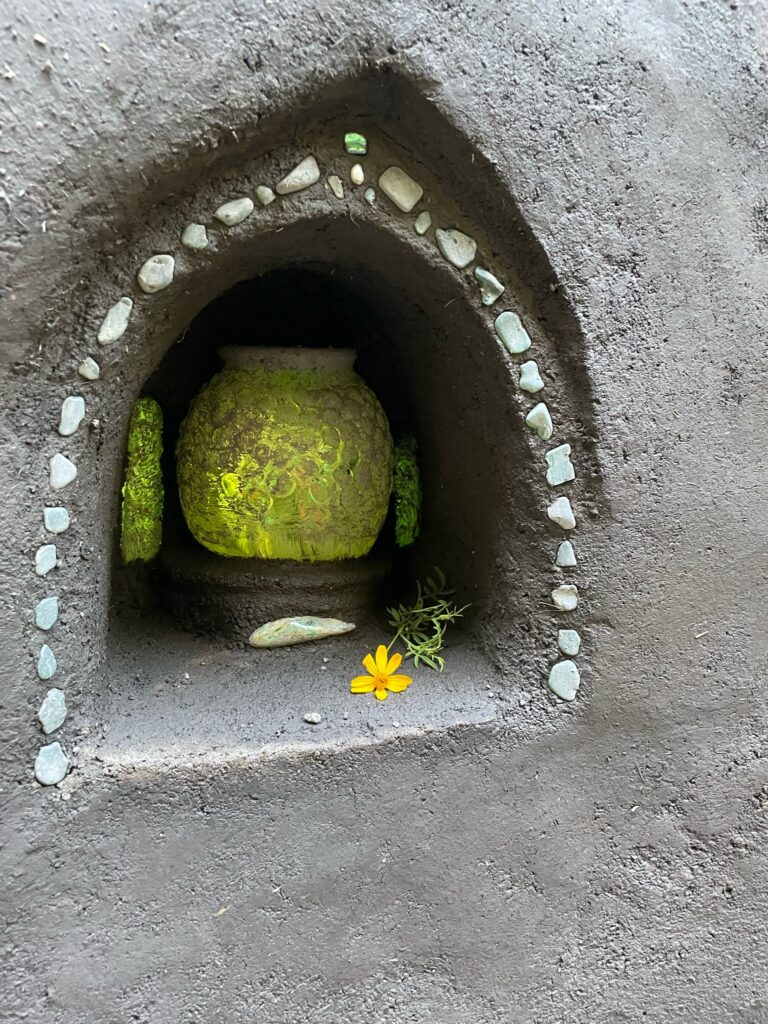 uilding, subject to Instructor approval. All weekend meals are provided by students who are welcome to use the kitchen. Host and/or other students can carpool into town for weekend food provisions.
uilding, subject to Instructor approval. All weekend meals are provided by students who are welcome to use the kitchen. Host and/or other students can carpool into town for weekend food provisions.
The 35-day Course will offer practical learning by building a complete 15m2 curvilinear building from foundation to roof, as described in the “Project” section. Those who complete the 35-day Workshop will receive an Advanced Cobber Certificate of Completion for Foundation, Cob Walls (which includes Door, Windows, Shelves, Art, Electrical Housing & Plumbing preparation), Floor, Plaster & Roof.
DAILY SCHEDULE
The daily schedule (subject to slight modifications due to climate/time of year) will be:
7:30-8:15 Breakfast
8:30-1:00 Class
1:00-2:30 Lunch
2:30-5:30 Class (Lecture on MWF’s)
5:30-7:00 Rest/Yoga
7:00-8:00 Dinner
8:00-9:00 Slides/Videos/Discussion (once a week)
Students are expected to be on time and participate in all sessions and required activities as the goal of building a full construction depends on the whole group working together!
COURSE CONTENTS
Students will learn every phase of building a cob building from foundation through the reciprocal roof in hands-on building and lectures/theory. In addition to the lectures, slideshows and videos will be shown to support and enhance their understanding of cob materials, cob building, design, geography, budgeting, business options and legal issues.
Our hands-on practice will include:
digging foundation trench
pouring gravel and inserting drainage pipe (if applicable)
building foundation stemwall
analyzing soils and materials
making test bricks
deciding on correct mixture
deciding on best location
making cob w/ partner and solo
building with cob
preparing and inserting the door
preparing and inserting fixed and opening windows
preparing and inserting shelves
inserting bottle windows, glass and other objects
inserting electrical housing and outlet/switch boxes (when applicable)*
insert PVC pipe for plumbing in walls (when applicable)*
sculpting
preparing and applying earthen plaster (1 coat)
pouring an earthen floor (2 coats)
preparing walls for roof connection
building reciprocal roof frame
putting on roof sheathing and other elements
installing green roof
making small-scale cob designs of future projects, time permitting
In addition to Cob Building practices, the Course material
also includes:
legal cob construction practices & the international cob code (Appendix AU in the IRC)
cost analysis
creating a cob business (building/teaching)
assisting, interning and teaching with CruzinCobGlobal
*While the insertion of electrical housing and one or more outlet/switch boxes and PVC pipes to hold plumbing are always included in the workshops, the simplicity or complexity depends on the host’s design and preferences. There will be no electrical wiring or plumbing pipes installed during workshop. That is beyond the focus of this course and requires professional experience and certification/licensing.
REQUIREMENTS & IMPORTANT INFORMATION
Students will need to come prepared for demanding physical work from Day 1.
This includes bringing:
Work clothes appropriate for the country and climate we are in
Work boots or other closed-toe shoes (for foundation and roof)
Flip-flops (for cobbing/plaster days)
Rubber dishwashing gloves (for lime mortar)
Work Gloves (for stone work)
Tape Measure
Box Cutter
Wood Hand Saw (cheap)*
Level (2ft)*
Hammer*
Japanese plastering trowel(s) (email:goldhillclayplaster@gmail.com)
Ear Plugs (roof week) Safety Glasses
Wood Chisel*
4”-6” Diameter Round Plastic Container Lids (for plastering)
Good Moisturizer
Hat
Sunglasses
Water Bottle
Notebook/Pen/Camera
Carpenter Pencil & Sharpener
Sample of your Soil (optional)
Any other power tools like skilsaw, grinder wth metal blade, cordless drill, chop saw, extra hammers, trowels, saws, levels…will be very welcome if you have them and are driving in. Some students fly in wth only carry-on luggage and can’t bring some of these tools.
*These tools will be very helpful to bring if you can, to minimize sharing and waiting, but if you can’t the Host will provide them.
***PLEASE READ THIS VERY IMPORTANT INFO!!!***
These workshops are designed for people that want to learn how to build a complete structure from start to finish in a professional manner and efficient amount of time. They are VERY intensive and, while we have time for yoga, stretching, dancing, music, relaxing….all students are expected to be present and participating in all building and lecture learning hours unless absolutely incapable due to illness or have some other significant/emergency reason. This is because we design the size of the building
and organize the structure of the workshop in accordance with the number of students and when people are absent, it impacts the whole group and the other students have to work harder and it disturbs the integrity of the group. It takes the whole village to see the building through from start to finish! In addition, Instructors set up building work according to students’ strengths and learning needs. In short, if you don’t feel that you will be able to be present every day for every session, please re-think your readiness for our Advanced Training. We attract serious and highly-motivated students so if that’s you, you will be surrounded by others with the same desire to learn and build!
We need and depend on everyone’s full participation in each day of the workshop. This is a total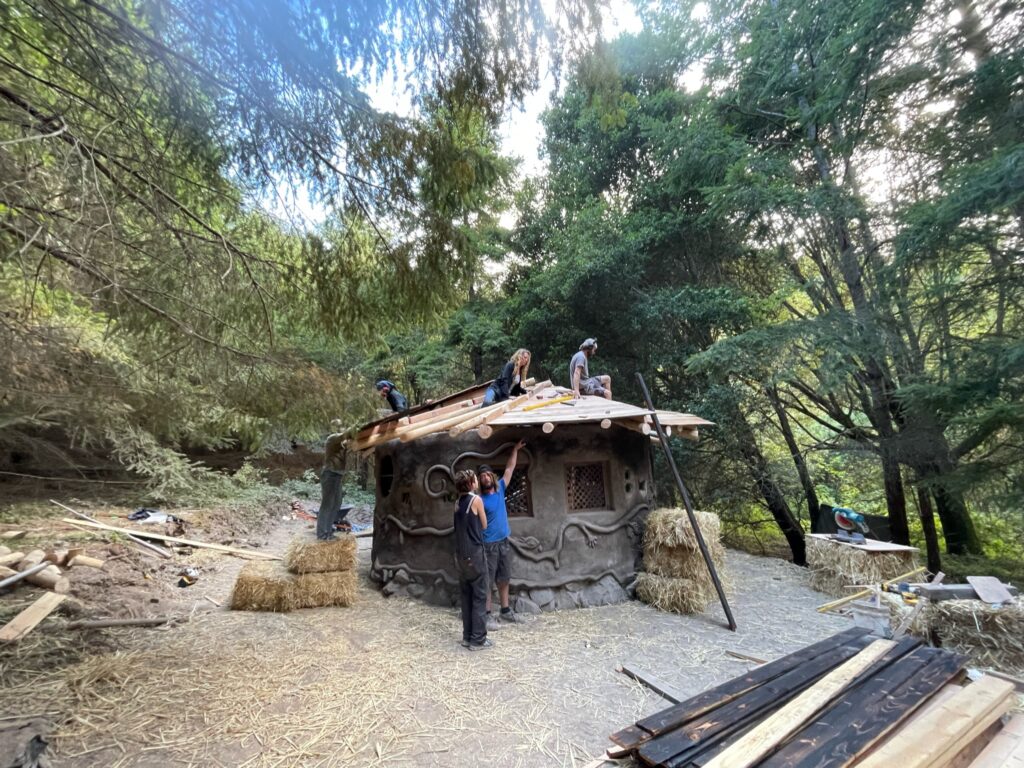 group effort on all levels: physically, mentally, emotionally and energetically.. If someone is physically absent from the site and lectures due to illness or other urgency for more than one full day, they will need to make up the days missed in a subsequent workshop to receive the Certificate (only paying food costs). If physically injured or ill and capable, it is requested students still be present at the site and for lecture and other required evening activities, so as to not miss out on information and keep learning by observation, and thus still qualify for the Certificate.
group effort on all levels: physically, mentally, emotionally and energetically.. If someone is physically absent from the site and lectures due to illness or other urgency for more than one full day, they will need to make up the days missed in a subsequent workshop to receive the Certificate (only paying food costs). If physically injured or ill and capable, it is requested students still be present at the site and for lecture and other required evening activities, so as to not miss out on information and keep learning by observation, and thus still qualify for the Certificate.
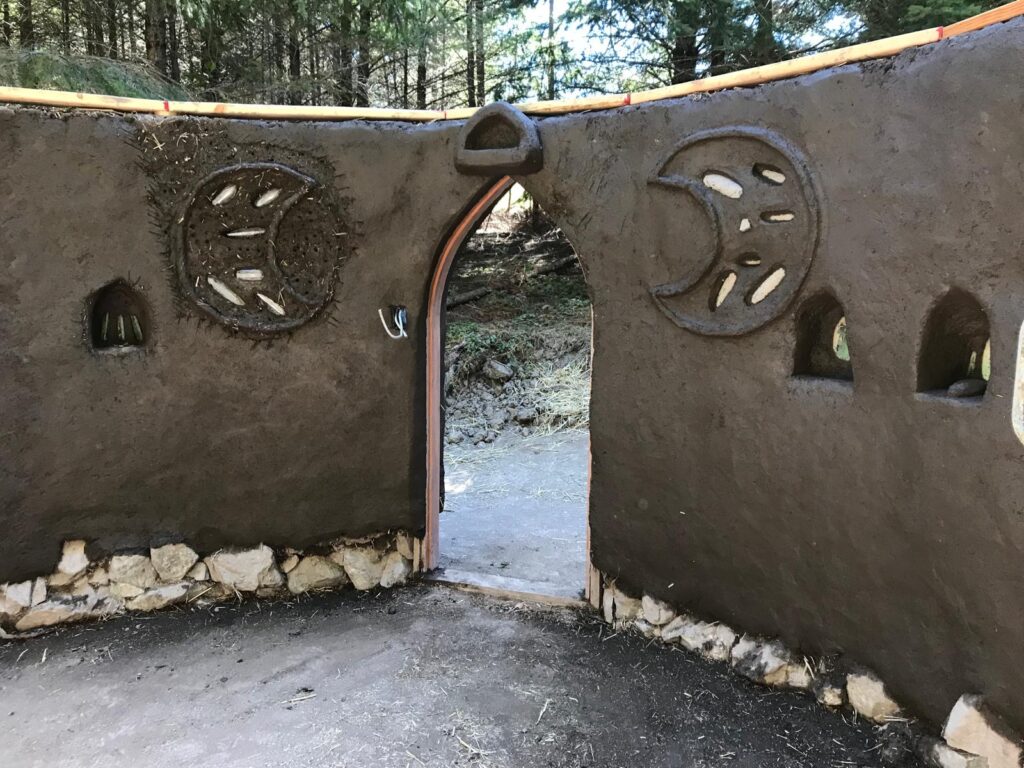 The workshop intensity changes from week 1 to week 5 with the focus of the week. The first foundation week breaks people in with the work of moving, lifting, rolling and placing rocks and is a new and demanding physical and mental experience for most students. It also includes
the first layers and coat of cob floor. The second week and part of the third week of cob-making and building are similar to the rock foundation week in physical demand, but are more flowing, multi-faceted and cardiovascular in movement. On Thursday & Friday of week 3, the workshop takes a turn and slows down and the body can rest as students their creative source now and design and sculpt the walls and around niches, shelves, windows, etc. This is a very special rewarding experience and time of the workshop, decorating the walls with visual beauty and meaning as expressed by each unique student. Usually there is an overarching theme
The workshop intensity changes from week 1 to week 5 with the focus of the week. The first foundation week breaks people in with the work of moving, lifting, rolling and placing rocks and is a new and demanding physical and mental experience for most students. It also includes
the first layers and coat of cob floor. The second week and part of the third week of cob-making and building are similar to the rock foundation week in physical demand, but are more flowing, multi-faceted and cardiovascular in movement. On Thursday & Friday of week 3, the workshop takes a turn and slows down and the body can rest as students their creative source now and design and sculpt the walls and around niches, shelves, windows, etc. This is a very special rewarding experience and time of the workshop, decorating the walls with visual beauty and meaning as expressed by each unique student. Usually there is an overarching theme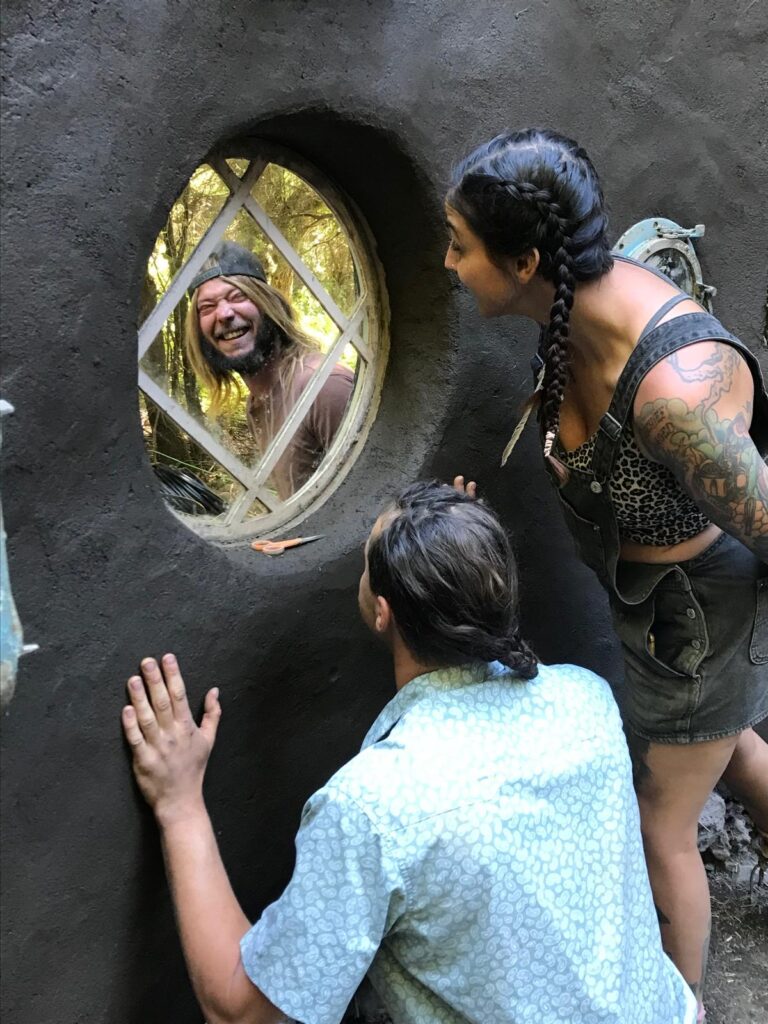 decided on by Host(s). Plastering follows sculpting and is also an enjoyable more lightweight physical experience, that lends itself to talking and sharing at the wall in a meditative rhythm as the students have bonded and shared deeply through a variety of experiences for a month. On day 5 of week 4, the roof begins. This part is the beginning of a change of pace from the earthen building work to carpentry skills, power tools, measuring, sawing, drilling, hammering, screwing, trimming, etc. But now the workshop is in its final stretch and there is a boost of energy to wrap up the roof, close the top of the wall, and tend to finishing touches….the grand finale.
decided on by Host(s). Plastering follows sculpting and is also an enjoyable more lightweight physical experience, that lends itself to talking and sharing at the wall in a meditative rhythm as the students have bonded and shared deeply through a variety of experiences for a month. On day 5 of week 4, the roof begins. This part is the beginning of a change of pace from the earthen building work to carpentry skills, power tools, measuring, sawing, drilling, hammering, screwing, trimming, etc. But now the workshop is in its final stretch and there is a boost of energy to wrap up the roof, close the top of the wall, and tend to finishing touches….the grand finale.
For students wanting a more mellow slow-paced cob experience, along with time for personal exploration and experimentation folowing their own rhythm, these workshops are not for you! However, you can find a more suitable workshop online with other organizations that offer a shorter period, building a garden wall, a bench, a compost toilet or some other smaller scale project.
Students are required to read “The Hand-Sculpted House” and “Essential Cob Construction” (see website Resources page) before the workshop begins, and any other books they find or are listed on our Resources page, ideally on plastering 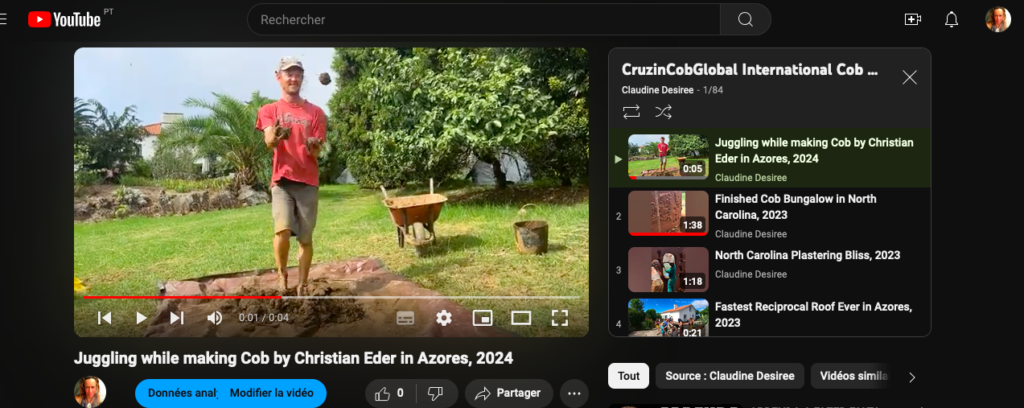 and reciprocal roof building. We ask that you watch the many videos on our our “International Cob Workshop” playlist on Claudine’s YouTube channel, the new educational YouTube series “Building a Mud Home” by Cooper Green, posted by Natural Buildings and created from our North Carolina workshop footage, and the ones posted on CruzinCobGlobal’s website under Gallery, to get an idea of what is expected. Also it is a great idea to watch as many other videos on cob and reciprocal roofs as you can to come mentally prepared. Please bring your book(s).
and reciprocal roof building. We ask that you watch the many videos on our our “International Cob Workshop” playlist on Claudine’s YouTube channel, the new educational YouTube series “Building a Mud Home” by Cooper Green, posted by Natural Buildings and created from our North Carolina workshop footage, and the ones posted on CruzinCobGlobal’s website under Gallery, to get an idea of what is expected. Also it is a great idea to watch as many other videos on cob and reciprocal roofs as you can to come mentally prepared. Please bring your book(s).
Students must tend to their own personal needs, drink alot of water, rest when needed and 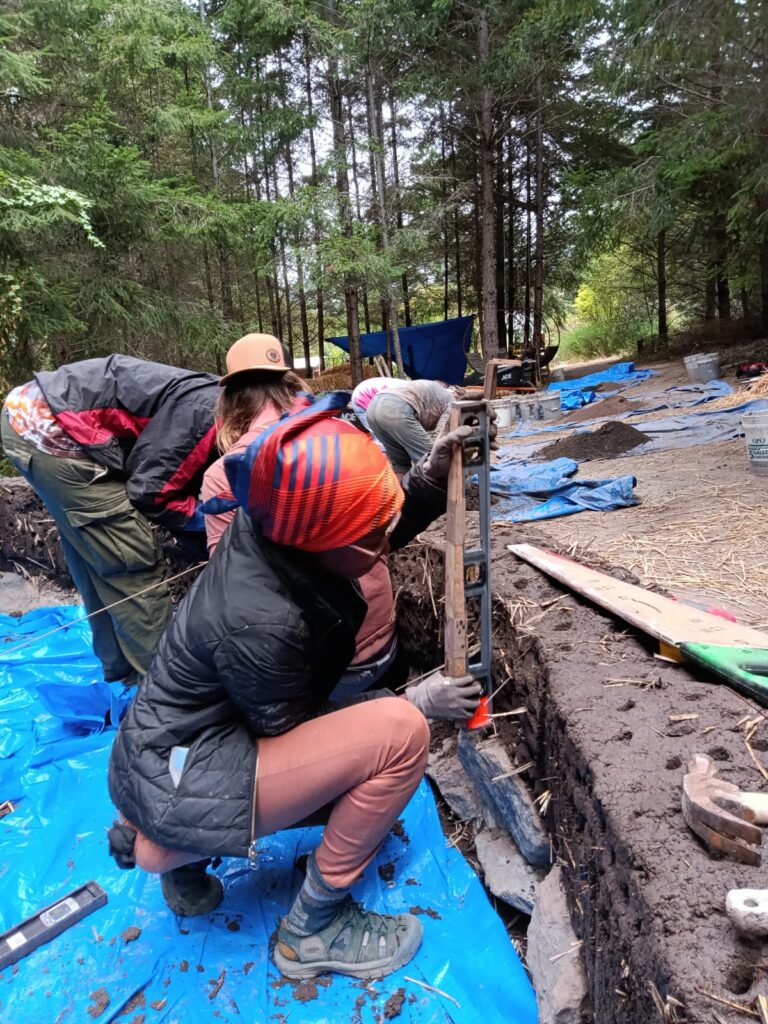 exert themselves at a steady pace. Students who cannot do the strenuous physical work should let us know when registering, so we can make sure the workshop is a good fit. If approved before the workshop begins, we will aim to adjust appropriately. There is alot to do to support making and building with cob while respecting your physical limitations!!!
exert themselves at a steady pace. Students who cannot do the strenuous physical work should let us know when registering, so we can make sure the workshop is a good fit. If approved before the workshop begins, we will aim to adjust appropriately. There is alot to do to support making and building with cob while respecting your physical limitations!!!
Finally, please bring a watch or use your phone to be prompt and ready for each part of the Course including meals. Please make sure you share your dietary restrictions/allergies with CCG in your registration form. Note that very demanding dietary needs will not be able to be met (vegan & non-gluten ok) and those students may be recommended not to participate, unless they are willing to meet their special needs on their own, which will not include kitchen access on weekdays. Please discuss with Claudine at time of desire to register. Also please bring your essential snacks and foods, pillow and whatever you NEED to be comfortable and happy. Feel free to also bring playlists, speaker, slides, videos, movies and books to share, as well as a sample of your soil to test.
We look forward to opening you to a whole new world of experience, skill, growth and transformation as you bond with your new COB family for life!
MEALS & ACCOMMODATIONS
We will serve three meals a day from Monday through Friday including the Welcome and Celebration Dinners and Farewell Brunch. Weekends students will be on their own for food and may use the onsite kitchen. Meals will be vegetarian and locally-based as much as possible, including farm produce and eggs! Carnivores & pescatarians & omnivores will, if desired, be offered non-vegetarian options of meals a few times a week and/or supplemented with canned fish, dried meats, cold cuts. They are also welcome to buy additions to cook on the side.
We will attend to vegan and gluten-free diets if needed, but any other restrictions & allergies that require extensive preparation needs will probably not be able to be honored. And kitchen will only be accessible on weekends for students.
Camping with your own tent and bedding is free. Students at this workshop are also welcome to rent a bed in a shared cabin with other students. The Whippoorwill cabin is open (photos above) for 4 students @ $15/night each, and, if desired, more cabins can be made available. Otherwise, please bring a good tent and warm sleeping bag, pad, pillow and blanket just in case… or camping hammock. The camping zone includes showers, fire circle, cooking areas and beautiful Nature and views!
TRANSPORTATION
Students can fly in to Chattanoga (CHA), Atlanta (ATL), Knoxville (TYS) and even Asheville (AVL). There are shuttles, carpools with other students, and the Hosts can organize airport pickups in Chattanooga. More info will be provided in the Welcome Letter sent a month before the workshop starts and a Whatsapp group will be created so students can organize rides.
TOM VAN WELL
Cob Instructor
I’m Tom from the Netherlands and living and working in Portugal now. I was born in Amsterdam, soon after which my parents decided to take me out of the big city and we moved to Maastricht! Other cultures and languages were never far away, in Belgium and Germany right next door.
Amsterdam, soon after which my parents decided to take me out of the big city and we moved to Maastricht! Other cultures and languages were never far away, in Belgium and Germany right next door.
Doing honor to the region, I got my bachelor’s degree in ‘European Studies’, with no clue of where I wanted it to take me. However, following the example of an entrepreneurial father, I’d always known I wanted to do something for myself. I explored different paths which led me to South America for more than a year, where I was first introduced to earthen building and sustainable lifestyles. I finished my bachelor’s degree in Berlin and decided to stay there to work in a café, which I had been doing on and off since the age of 14.
Leaving all my stuff in Berlin, I decided to head to Portugal, and never returned. Life took me on a rollercoaster and since that felt good, I did not resist. While living on farms, my partner and I learned about distillation of wild plants for essential oils and hydrosols. Over the last 2 years we have led people on hands-on distilling experiences and travelled around Lisbon selling our products at markets.
Four years after leaving Berlin, I still find myself in Portugal, climbing its rocks, taking cold baths every morning in the Atlantic, playing guitar on the beaches, building my community of like-minded people, developing my own COB projects and continuing the business of artisanal distillation projects, all while enjoying life!
After some years of study, I found CruzinCobGlobal and registered for two workshops back to back: a Cob Oven course in the Azores and a 5-week Full Build in Tennessee. This turned out to be a catalyst for my skills and the beginning of the next new chapter of my Life: building independently, sharing knowledge through workshops and growing my COB community in Portugal.
Co-leading the 5-week Full Build Workshop in Puerto Rico in January will be a continuation of my teaching and learning journey, and my official entrance into the CruzinCobGlobal teaching world, which I am very excited about and proud of and have been working hard to prepare for. I feel blessed co-teaching that workshop with my friend Christian, whom I also met in a CCG workshop! I am super excited to be leading in Texas and Chattanooga as a Full Instructor. I can’t wait to meet you all and for you to join us, as these workshops are a life-changing experience, and have definitely been for me! See you in the Fall!
ELLIOTT BEDFORD
Cob Assistant
My name is Elliott ( L for short ). I was born and raised in a little beach town off the East Coast of Florida. I grew up with a solid work ethic, helping my step Dad with his lawn service/landscaping company as well as home projects and repairs, before I could drive. I learned at a young age to work on roofs, due to Florida hurricanes. Always my step Dad’s right hand man on land as well as on the ocean, I spent many early mornings fishing between the days of hard work.
Over the years I had second and third jobs in the marine, boat, and fishing industry, while attending community College. One memorable place was Honest John’s Fish Camp, a family homestead since the 1880s. Here I drove a tractor to move and launch boats, rented kayaks, and enjoyed meeting many wonderful people. While working there, I had the opportunity to help with small tasks on a geodesic dome home build. It was the first non-traditional building I would experience.
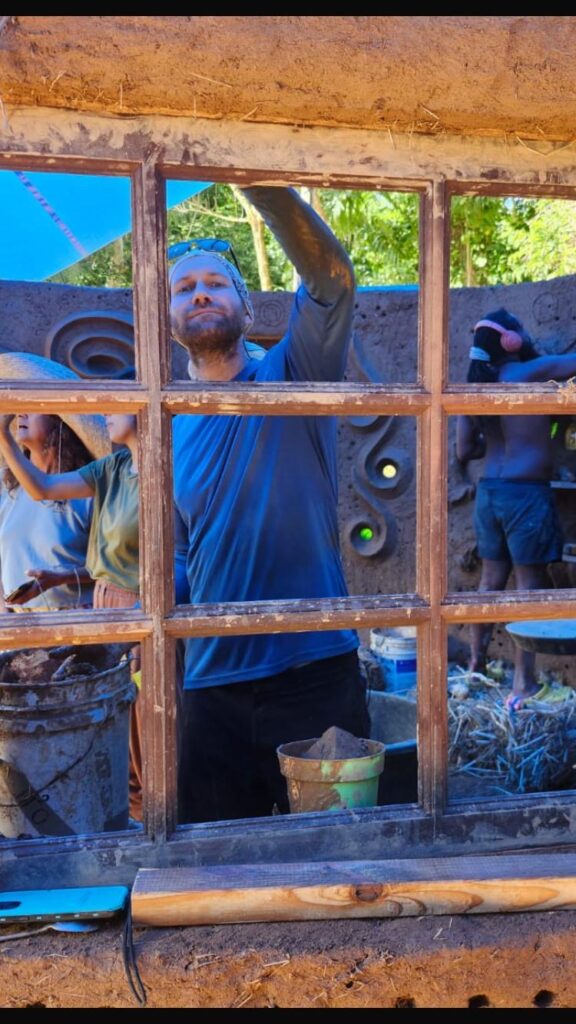 When my step Dad retired from the lawn service industry, it was my turn to take the reins. For the past 7 years I worked to keep the customers very happy, some may have said I was better than the last guy (lol). Florida summers seemed to get hotter while good help became hard to find. I started to realize I was going to be doing the same work week after week year after year if I didn’t make a change.
When my step Dad retired from the lawn service industry, it was my turn to take the reins. For the past 7 years I worked to keep the customers very happy, some may have said I was better than the last guy (lol). Florida summers seemed to get hotter while good help became hard to find. I started to realize I was going to be doing the same work week after week year after year if I didn’t make a change.
When I first learned about Cob, I was infatuated with its beauty and sustainability. As someone who had the experience of ceramics classes in school, I thought “Wooowwww!” I can sculpt fish! Finding CCG was the next step. I felt that I had found something to do with a greater purpose. I hadn’t traveled much outside of the bubble I was living in. The idea of spending time seeing new places and meeting new people sounded pleasant to the ears. My partner and I wanted our two boys to have this opportunity of learning and growing as a family. We started to put thought as to how we could do life differently.
As of 2024 we have begun spending summers in Murphy, NC while I travel to develop my Cob knowledge with CCG. I have had the great opportunity to meet amazing people building in California, Hawaii and Puerto Rico. I’m very happy to have begun the ability to continue building physically and mentally with CCG. I feel so much joy in helping others learn and grow on this path.
REGISTRATION & PAYMENT
Very Early Bird Rate: USD$2500, paid in full by February 9th, 2025
Early Bird Rate: USD$2600, paid in full by June 1st, 2025
Standard Rate: USD$2700, paid in full by August 3rd, 2025
We are offering 4 work trade positions which give you a $250 discount for working one hour each weekday from 6:30am to 7:30am either on the site prepping materials and other work as guided by the Instructors or preparing & putting away breakfast. Two persons for each service. These are the first options to go. Depending on when you pay in full, the discount is taken off the appropriate amount.
Payment can be made using Zelle, Paypal and Venmo to claudinedesiree@gmail.com. Europeans and other international students can pay in USD using the Wise app/website using same email.
Please contact claudine@cruzincobglobal.org or Whatsapp +1(831) 212-7225 to register and ask any questions.
To hold your spot (there are 12 for new students and 3 for returning students), you can make a 50% deposit. The balance owed depends on the date of payment in full. Final payment deadline is August 3rd, 2025.
CANCELLATION POLICY
Students who have paid and cancel by June 1st, 2025 can get a full refund minus a 5% administrative/inconvenience fee on the amount they have paid.
Students who have paid and cancel by July 1st, 2025 will receive a credit for a future workshop within two years minus a 10% administrative/inconvenience fee.
Students who have paid and cancel after July 1st, 2025 will not receive a refund or credit unless they have proof of an emergency situation or other reason out of their control, in which case they will receive a credit for two years minus the 10% admin fee.
SEE YOU IN THE MUUUUUUD!
Location: Talking Waters Nature Retreat
